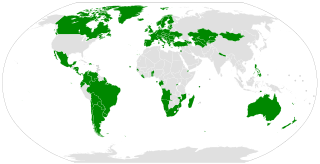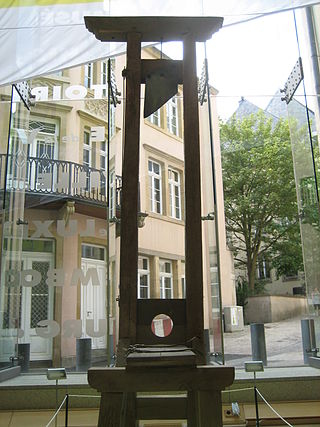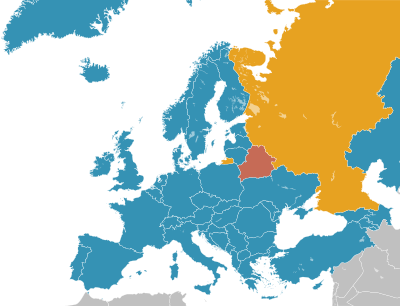
Capital punishment in France is banned by Article 66-1 of the Constitution of the French Republic, voted as a constitutional amendment by the Congress of the French Parliament on 19 February 2007 and simply stating "No one can be sentenced to the death penalty". The death penalty was already declared illegal on 9 October 1981 when President François Mitterrand signed a law prohibiting the judicial system from using it and commuting the sentences of the seven people on death row to life imprisonment. The last execution took place by guillotine, being the main legal method since the French Revolution; Hamida Djandoubi, a Tunisian citizen convicted of torture and murder on French soil, who was put to death in September 1977 in Marseille.

Capital punishment in Sweden was last used in 1910, though it remained a legal sentence for at least some crimes until 1973. It is now outlawed by the Swedish Constitution, which states that capital punishment, corporal punishment, and torture are strictly prohibited. At the time of the abolition of the death penalty in Sweden, the legal method of execution was beheading. It was one of the last states in Europe to abolish the death penalty.

Capital punishment has been completely abolished in all European countries except for Belarus and Russia, the latter of which has a moratorium and has not conducted an execution since September 1996. The complete ban on capital punishment is enshrined in both the Charter of Fundamental Rights of the European Union (EU) and two widely adopted protocols of the European Convention on Human Rights of the Council of Europe, and is thus considered a central value. Of all modern European countries, San Marino, Portugal, and the Netherlands were the first to abolish capital punishment, whereas only Belarus still practises capital punishment in some form or another. In 2012, Latvia became the last EU member state to abolish capital punishment in wartime.
Capital punishment in the Philippines specifically, the death penalty, as a form of state-sponsored repression, was introduced and widely practiced by the Spanish government in the Philippines. A substantial number of Filipino national martyrs like Mariano Gómez, José Burgos, and Jacinto Zamora, Thirteen Martyrs of Cavite, Thirteen Martyrs of Bagumbayan, Fifteen Martyrs of Bicol, Nineteen Martyrs of Aklan and Jose Rizal were executed by the Spanish government.

Capital punishment in Finland has been abolished de jure.
Capital punishment is forbidden in Switzerland by article 10, paragraph 1 of the Swiss Federal Constitution. Capital punishment was abolished from federal criminal law in 1942, but remained available in military criminal law until 1992. The last actual executions in Switzerland took place during World War II.

The use of capital punishment in Italy has been banned since 1889, with the exception of the period 1926–1947, encompassing the rule of Fascism in Italy and the early restoration of democracy. Before the unification of Italy in 1860, capital punishment was performed in almost all pre-unitarian states, except for Tuscany, where, starting from 1786, it was repeatedly abolished and reintroduced. It is currently prohibited by the Constitution of the Italian Republic with no more exceptions even in times of war.

Capital punishment in Armenia was a method of punishment that was implemented within Armenia's Criminal Code and Constitution until its eventual relinquishment in the 2003 modifications made to the Constitution. Capital punishment's origin in Armenia is unknown, yet it remained present in the Armenia Criminal Code of 1961, which was enforced and applied until 1999. Capital punishment was incorporated in Armenian legislation and effectuated for capital crimes, which were crimes that were classified to be punishable by death, this included: treason, espionage, first-degree murder, acts of terrorism and grave military crimes.

Capital punishment in Austria was abolished in 1787, although restored in 1795. Unlike other countries with a minimum age of 18, the Habsburg Law enacted in 1919 set the minimum age for execution in Austria to 20.

Capital punishment in Belgium was formally abolished on August 1, 1996, for all crimes, in both peacetime and wartime. The last execution for crimes committed in peacetime took place in July 1863, when in Ypres a farmer was executed for murder. The last execution for an ordinary crime took place on 26 March 1918 at Veurne Prison when Emile Ferfaille, a military officer found guilty of killing his pregnant girlfriend, was guillotined. This was the first execution to be carried out since 1863. The guillotine that was used had to be imported from France.

Capital punishment in Latvia was abolished for ordinary crimes in 1999 and for crimes committed during wartime in 2012. Latvia is party to several international instruments which ban capital punishment.

The Second Optional Protocol to the International Covenant on Civil and Political Rights, aiming at the abolition of the death penalty, is a subsidiary agreement to the International Covenant on Civil and Political Rights. It was created on 15 December 1989 and entered into force on 11 July 1991. As of April 2022, the Optional Protocol has 90 state parties. The most recent country to ratify was Kazakhstan, on 24 March 2022.
Capital punishment is legal in Tonga, but has not been imposed since 1982. The country's lack of executions puts it into the category of abolitionist in practice, where it retains the death penalty in law but has had a formal or informal moratorium for at least ten years. Tonga's low rate of murder convictions form part of the reason for the lack of executions, as well as its courts’ apparent unwillingness to impose the penalty unless it appears absolutely necessary to do so.
Capital punishment is no longer applied in San Marino: the last execution was carried out in 1468 or in 1667, by hanging.
Capital punishment in Peru was last used in 1979. In the same year, the death penalty was abolished for ordinary crimes. Peru is one of seven countries that has abolished capital punishment for "ordinary crimes only." Peru voted in favor of the United Nations moratorium on the death penalty in 2007, 2008, 2010, 2012, 2014, 2016, 2018, and 2020. Peru is not a member state to the Second Optional Protocol to the International Covenant on Civil and Political Rights.
Capital punishment in Kazakhstan was abolished for all crimes in 2021. Until 2021, it had been abolished for ordinary crimes but was still permitted for crimes occurring in special circumstances. The legal method of execution in Kazakhstan had been shooting, specifically a single shot to the back of the head.

Capital punishment in Luxembourg was abolished for all crimes in 1979.
Capital punishment has been abolished in Seychelles. The country permanently abolished the death penalty by a Constitutional amendment in June 1993.
Capital punishment in Angola was abolished by constitution in 1992. In 1977, it performed its last executions, which were of Nito Alves and many of his supporters, who were convicted of treason. The execution method in Angola was by firing squad. Angola signed the Second Optional Protocol to the International Covenant on Civil and Political Rights on September 24, 2013, and ratified it on October 2, 2019. Angola voted in favor of the UN moratorium on the death penalty in 2007, 2008, 2010, 2012, 2014, 2016, 2018, and most recently, 2020.
Capital punishment is a legal sanction in Chile, but its use has been limited to military personnel for war crimes and crimes against humanity committed during wartime, since its abolition for civilian offenses in 2001. Chile is one of seven countries that has abolished capital punishment for ordinary crimes only. The method of execution in Chile is by shooting, which was last carried out on January 29, 1985, when two serial killers, Jorge Sagredo and Carlos Topp, were executed by firing squad.




